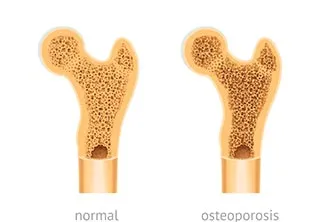What is Tendinopathy?

What is Osteoporosis?
Derived from Latin for ‘porous bones’, osteoporosis is a condition that affects a person’s bones and makes them extremely weak and brittle. People with this condition often have bones that lose their density and strength and become very susceptible to fractures, sometimes even due to otherwise insignificant impacts or mild stress. Osteoporosis increases the size of the hollow spaces inside the bones that are usually found even in healthy bone structures, thereby causing weakness and brittleness. Osteoporosis diagnosis will involve a physical exam at first, and if your doctor suspects that you have the condition, a bone density test will likely be required to confirm the diagnosis.
Causes
There is no one universal cause of the condition, but there are several possible osteoporosis causes ranging from calcium deficiency to hormonal imbalances. There are also certain osteoporosis risk factors that significantly increase the chances of one developing the disease, and these include old age, menopause, family history of osteoporosis, poor diet and so on. Several studies show that women are also more likely to develop the condition than men. It has been estimated that more than 200 million people suffer from osteoporosis worldwide
Symptoms
The challenge in identifying and treating osteoporosis is that in a majority of cases, there are close to no symptoms in the early stages of the disease. However, the following are some symptoms of osteoporosis that may appear if you suffer from the condition:
- Easily fractured bones:The most telling sign that you may have osteoporosis is when a bone breaks way more easily than it is supposed to. For example, if you walk into a wall by mistake but end up fracturing your arm even though the impact was relatively low, your bone density might be low, which is an indication of osteoporosis.
- Stooped posture and back pain: Osteoporosis may also affect the bones in your spine, which may cause it to bend over time, thereby affecting posture and also causing back pain. This may also be accompanied by a slow loss of height.
Treatment
Osteoporosis treatment will depend on several factors such as the severity of the condition, your age and what your doctor believes is the best way forward. Apart from traditional medical approaches, there are certain osteoporosis home remedies that may help you better cope with the condition:
- Exercise: Regular exercise that includes weight-bearing variants will keep your bones active along with your muscles which tells your body to build new bone tissue.
- Diet: Follow a healthy diet that is rich in vitamins and minerals and ensure that you are getting enough calcium, Vitamin D and protein that are all crucial for good bone health.
- Avoid smoking: Smoking is believed to worsen osteoporosis and increase the rate of bone loss, thereby making you more prone to fractures and injuries.
- Practice caution: Be cautious to avoid falls and physical trauma that may cause severe damage to your bones.
When to see a doctor
If you feel like you suffered a fracture from an impact that should not have caused so much bone damage, it is advisable to talk to your doctor about it. Moreover, if you have a family history of osteoporosis, undergo early menopause or have certain health conditions such as thyroid imbalances, a regular check-up might help you get ahead of the disease.
Additional information and references will be provided on request. Please write to us on communications@pharmed.in